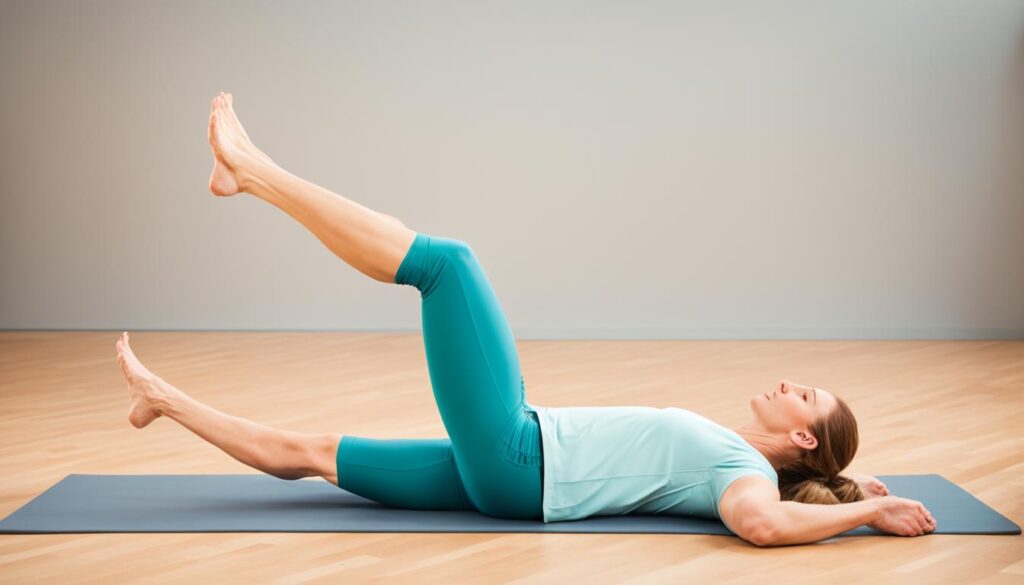Imagine waking up without that nagging ache in your lower back. For many, lower back pain is a daily battle. But, there are stretches and exercises that can bring relief. These simple moves can help, whether you’re dealing with a new injury or the effects of poor posture.
Lower back pain comes from many things, like sitting too much or sudden movements. Stretching isn’t a magic cure, but it can ease pain and increase flexibility. By focusing on key muscle groups with gentle stretches and exercises, you can work towards a healthier back.
Key Takeaways
- Regular stretching and exercise can help alleviate lower back pain
- Gentle stretches like child’s pose and pelvic tilts can provide relief
- Yoga poses can also be effective in loosening tight back muscles
- Strengthening exercises like the shoulder bridge can help support the back
- Consulting a healthcare professional is recommended for persistent or severe back pain
How to get rid of lower back pain with these easy moves
If you’re one of the 80% of people who will experience lower back pain, don’t worry. There are simple exercises and stretches you can do to find relief. Muscle strains or ligament sprains are the main causes of back pain. But, doing regular back exercises and stretches can help ease the pain and prevent more problems.
Back Exercises in 15 Minutes a Day
Just 15 minutes a day of back-strengthening exercises can make a big difference. Try the knee-to-chest stretch to gently stretch the lower back. Or do the bridge exercise to work the core muscles that support your spine. Doing these exercises a few times in each session and slowly adding more reps can help relieve and prevent lower back pain.
Gentle Stretches for Lower Back Relief
Along with exercises, gentle stretches can also help ease lower back pain. The cat stretch helps release tension by arching and rounding the spine. The seated lower back rotational stretch boosts mobility and flexibility. Adding these simple stretches to your daily routine can really help manage lower back pain.
It’s key to listen to your body and adjust exercises or stretches if they cause more pain. Being active, taking regular breaks from sitting, and doing general exercise can also support your lower back routine. This can help you find lasting relief from pain.
“Engaging in general movement and specific exercises can improve and prevent lower back pain.”
| Exercises | Benefits |
|---|---|
| Knee-to-Chest Stretch | Gently elongates the lower back |
| Bridge Exercise | Engages the core muscles to support the spine |
| Cat Stretch | Releases tension in the lower back |
| Seated Lower Back Rotational Stretch | Increases mobility and flexibility in the lower back |
Knee-to-Chest Stretch and Other Targeted Stretches
Targeted stretches can really help with lower back pain. The knee-to-chest stretch is great for relaxing the hips, thighs, and glutes. It also helps with flexibility. By bringing your knee towards your chest, you ease tension and improve flexibility.
The piriformis stretch is also good for lower back pain. It works on the piriformis muscle in your buttocks. If this muscle is tight, it can cause pain in the lower back and buttocks. Stretching it can help ease this pain and improve movement.
Knee-to-Chest Stretch
- Lie on your back with your legs extended.
- Bend one knee and gently pull it towards your chest, keeping your other leg straight.
- Hold the stretch for 30 seconds, then switch sides.
- Repeat the stretch 2-3 times on each side, focusing on slow, controlled movements.
Piriformis Stretch
- Sit on the edge of a chair or bench with your legs extended.
- Cross one ankle over the opposite thigh, creating a figure-four shape with your legs.
- Gently lean forward, feeling a stretch in your buttocks and lower back.
- Hold the stretch for 30 seconds, then switch sides.
- Repeat the stretch 2-3 times on each side.
Adding these lower back stretches to your daily routine can help relieve back pain. It also boosts flexibility and mobility. Always listen to your body and adjust the stretches as needed. If you feel sharp or persistent pain, stop and see a healthcare professional.

“Stretching the lower back and piriformis muscle can be incredibly beneficial for reducing pain and improving range of motion. The key is to be gentle and consistent with the exercises.”
| Stretch | Benefits | Recommended Frequency |
|---|---|---|
| Knee-to-Chest Stretch | Relaxes hips, thighs, and glutes; promotes overall relaxation | 2-3 times per day, holding for 30 seconds |
| Piriformis Stretch | Targets the piriformis muscle, which can contribute to lower back and buttock pain | 2-3 times per day, holding for 30 seconds |
Yoga Poses for Lower Back Pain Relief
Adding gentle yoga poses to your daily routine can help ease lower back pain. Try child’s pose and the cat-cow pose for a start. These poses strengthen your spine muscles, increase flexibility, and ease back tension.
Child’s Pose
The child’s pose is a calming yoga pose that stretches the gluteus maximus, latissimus dorsi, and spinal extensors. By moving your hips back towards your heels and stretching your arms forward, you release tension in your neck, shoulders, and lower back. Hold it for 30 seconds to 1 minute, breathe deeply to feel more relaxed.
Cat-Cow Pose
The cat-cow pose is great for relieving back pain and waking up the spine. Start on your hands and knees. Breathe in as you arch your back and lift your chest for the cow pose. Then, breathe out as you round your spine for the cat pose. Do this 5-10 times, focusing on smooth movements and even breathing. This pose stretches your shoulders, neck, and chest while strengthening your core to support your back.
Adding these simple yoga poses to your daily routine can make you more flexible, reduce tension, and strengthen muscles that support your lower back. Always listen to your body and stop if you feel sharp or intense pain. With regular practice, these poses can help relieve back pain and prevent future issues.
“Yoga has been shown to be effective in reducing lower back pain and improving function. The combination of physical poses, breathing exercises, and mental focus can help relax the body and mind, which may in turn reduce pain and improve overall well-being.”
Pelvic Tilts and Spinal Stretches
Adding pelvic tilts and spinal stretches to your daily routine can help ease lower back pain. Pelvic tilts strengthen the abdominal muscles, which support the spine and lessen lower back strain. Spinal stretches, like the seated twist, boost back, hips, and shoulders mobility and flexibility.
Pelvic Tilts
Start by lying on your back with knees bent and feet flat. Tilt your pelvis forward, engaging your abs to flatten your lower back. Hold it for a few seconds, then release and do it again. This exercise targets core muscles that support your spine, helping to ease back pain remedies.
Seated Spinal Twist
Sit with your legs out in front of you. Bend your right knee and place your right foot outside your left thigh. Twist your torso to the right, pressing your right knee with your left hand. Hold for 30 seconds, then switch sides. This stretch helps increase mobility and eases tension in the lower back, hips, and shoulders.
Adding these exercises to your daily routine can help strengthen your lower back and prevent pain. Always listen to your body and stop if you feel sharp or severe pain. If you have concerns, talk to a healthcare professional before starting a new exercise program.

Strengthening Exercises for Back Pain
Strengthening your core and back muscles can help reduce back pain. Doing targeted exercises can make your lower back more stable. It can also improve your posture and lessen strain and tension. Try the shoulder bridge and the standing roll-down exercises for good results.
Shoulder Bridge
The shoulder bridge is a simple yet effective exercise. It helps mobilize the spine and lengthen back muscles. Here’s how to do it:
- Lie on your back with your knees bent and feet flat on the floor.
- Engage your core muscles and slowly lift your hips off the ground, pressing your shoulders into the floor.
- Hold the position for 10-15 seconds, then gently lower your hips back down.
- Repeat this exercise 15 times, in 3 sets.
Standing Roll-Down
The standing roll-down targets the entire spine. It opens up the space between each vertebra. This helps relieve tightness and resets your posture. Here’s how to do it:
- Stand with your feet hip-width apart, knees slightly bent.
- Slowly begin to roll your torso forward, vertebrae by vertebrae, until your hands nearly touch the floor.
- Hold the stretch for a few seconds, then use your abdominal muscles to roll your spine back up to the starting position.
- Repeat this exercise 10 times.
Adding these back strengthening exercises to your routine can help reduce back pain. It can also improve your spinal health. Start with a manageable number of repetitions and increase as you get stronger and more flexible.
“Strengthening the core and back muscles is crucial for preventing and managing back pain. These exercises can make a significant difference in your daily comfort and mobility.”
Conclusion
Lower back pain is a common issue with many causes, like medical conditions, poor posture, and muscle imbalances. Stretching and exercises can help ease the pain and boost flexibility. Just 15 minutes a day of these simple moves can help you overcome lower back pain and stop it from coming back.
Always pay attention to your body and see a doctor if the pain doesn’t go away or gets worse. The exercises and stretches mentioned here can help, but finding the root cause of your pain is key. With the right steps, you can handle your symptoms and keep living a healthy, active life.
Adding these easy yet powerful techniques to your daily life can help you fight lower back pain and better your health. Don’t let back pain slow you down – take charge of your health now.



